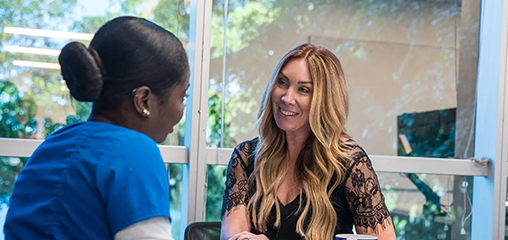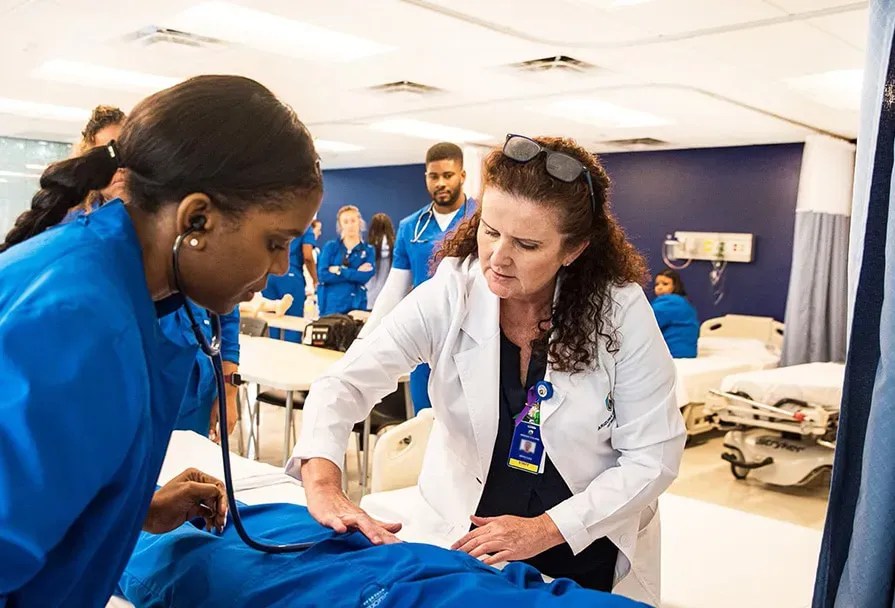Become an RN in South Carolina: FAQs at our Greenville Campus
Become a RN with a BSN degree at Arizona College of Nursing – Greenville. Below you will find some of the frequently asked questions that future Registered Nurses often ask our campus faculty and staff.
Classes begin May 4th

How long does it take to become a registered nurse (RN)?
The length of time it takes to become an RN with a BSN can vary depending on the program and the student’s prior educational background. Bachelor’s degrees often take 4 years to complete, but with our 3-year BSN program, you can complete your Bachelor of Science in Nursing degree in as few as 3 years.
If you have completed some college credit or have a degree in another field, qualifying transfer credits can shorten your program length. To learn more about the pathway to becoming an RN with a BSN degree in South Carolina, contact an admissions representative at our Greenville campus.
Nursing Career Frequently Asked Questions
Registered Nurses in the Greenville-Anderson-Greer area of South Carolina have a median nursing salary of $79,580 per year.
As you will be newly entering the workforce, it’s important to know that you will likely not start at the median rate but would likely increase your earnings with experience. To view our Greenville nursing market outlook click here.
The Bureau of Labor Statistics states that Registered Nurses in South Carolina range from a low rate of $64,200 per year, to the highest-paid Nurses earning as much as $102,040 per year for their nursing salary.
Updated May 2025. Source: https://www.onetonline.org/link/localwages/29-1141.00?zip=29615
As of 2022, there were 45,140 RNs employed in South Carolina.
Registered Nurses jobs in South Carolina are projected to grow by 10% between 2022 and 2032.
RN employment in the United States is projected to grow 5% from 2024 to 2034, creating 189,100 projected annual new nursing jobs.
Updated 08/2025. Data Source: https://www.onetonline.org/link/localtrends/29-1141.00?st=SC
One of the great benefits about working as an RN is that you have many different options for work environments. As of 2023, registered nurses held about 3.3 million nursing jobs.
The largest employers of registered nurses were as follows:
Hospitals (58%)
Ambulatory healthcare services (19%)
Nursing and residential care facilities (6%)
Government (5%)
Educational services; state, local, and private (3%)
Updated 2024. Source: https://www.bls.gov/ooh/healthcare/registered-nurses.htm#tab-3
Yes, nurses can work in other states after graduation, though the process depends on where you’re licensed and where you want to practice. Some states participate in the Nurse Licensure Compact (NLC), which allows registered nurses to practice across member states without obtaining additional licenses. Other states require nurses to apply for licensure by endorsement, which involves submitting documentation and fees to the new state’s board of nursing.
Graduating from a CCNE-accredited BSN program like Arizona College of Nursing prepares you to apply to sit for the national licensing exam, the NCLEX-RN, in the state in which you live. Once you pass, you’ll have options for where and how you build your nursing career. Our admissions team can help you understand how licensure works in South Carolina and what to expect if you’re planning to relocate after graduation.
Nursing Program Questions at Arizona College of Nursing – Greenville
Students can progress through our BSN program in three years or less with qualifying gen ed transfer credits. Transfer credits could be a way to help you graduate in less time and at a lower cost.
For questions about transfer credits, including credits associated with college-level credit test scores, visit our Campus Locations page for details to contact your local campus. Our admissions team will review your current transcripts and give you specific feedback on how past education might be eligible to be applied towards a BSN degree.
Read more about Arizona College of Nursing’s credit transfer requirements.
Students of all ages and backgrounds who qualify may be eligible for a variety of financial aid programs and payment options including:
- Federal student loans
- Federal PELL and SEOG grants
- Eligible State-based grant programs
- Private educational loans
- Military veteran educational benefits (ex: Post-9/11 G.I. Bill®)
In addition to financial aid, Arizona College of Nursing does offer scholarship opportunities. For more information on financial aid and scholarships, visit https://www.arizonacollege.edu/admissions/financial-aid/
Yes. While every student’s schedule may vary due to prior academic experience, you’ll start your BSN degree program with evening general education courses. In addition, some general education courses are offered in a convenient on-campus/online hybrid format.
We offer general education courses in the evening because we know students are busy and often can’t immediately change their entire schedule when starting Nursing school.
Once you begin your core nursing courses, your schedule will shift to daytime classes.
In 2024 Arizona College of Nursing had an average NCLEX-RN pass rate of 87.48%* across all campuses. As a new campus, Greenville does not yet have NCLEX-RN outcomes available specific to this location.
*Nevada NCLEX Pass Rate Data, Florida NCLEX Pass Rate Data, Texas NCLEX Pass Rate Data, California NCLEX Pass Rate Data, Michigan NCLEX Pass Rate Data, Utah NCLEX Pass Rate Data, Arizona NCLEX Pass Rate Data, Virginia NCLEX Pass Rate Data.
National NCLEX Pass Rate Data
Our BSN program curriculum covers important topics like clinical-thinking, community health, critical care, gerontology, leadership, surgical care, obstetrics, pediatrics, and psychiatric care.
Arizona College of Nursing – Greenville does not offer an LPN to BSN or an LPN to RN bridge program. However, you still have the ability to enroll in our program and earn your BSN degree in just three years!
Your prior LPN nursing experience will serve you well as you complete the coursework, and it will be especially helpful during the clinical training portion of the program.
We encourage you to contact our admissions team and mention your prior nursing experience. They’ll tell you more about how your LPN experience can help you in the BSN program.
Arizona College of Nursing (AZCN) – Greenville is not a 100% online nursing program in South Carolina. However, most of our campuses offer some online nursing courses. The AZCN curriculum includes a mixture of in-person, online, and blended classes. At the majority of our campuses, many non-clinical courses are offered asynchronously and delivered fully online, while nursing courses with a clinical component are held in person.
Our general education courses also incorporate a blended learning experience, including night and virtual classes, providing flexibility for our students. Contact our admissions team to learn more about our online nursing course formats at AZCN Greenville and how you can earn a BSN degree in just three years.
Comparing nursing schools can feel overwhelming, but there are a few key factors that can help you narrow down your options. Look at program length and format to make sure it fits your schedule, especially if you’re working or managing family responsibilities. Check whether the schools you’re considering have clear admissions processes or long waitlists that could delay your start. Ask about clinical partnerships and hands-on training, since the quality of your real-world experience matters for your confidence and career readiness. Finally, consider the support you’ll receive as a student, from academic resources to assistance with financial aid.
At Arizona College of Nursing in Greenville, we offer a three-year BSN program with flexible scheduling, a streamlined admissions process with no waitlist, and clinical rotations with healthcare partners across South Carolina. If you’re comparing nursing schools in South Carolina, our admissions team is here to answer your questions and help you take the next step.
General Nursing College FAQs
Understanding the differences between a Licensed Practical Nurse (LPN) program and a Bachelor of Science in Nursing (BSN) program is crucial to planning your nursing career path. LPN / LVN programs prepare you to become a Licensed Practical Nurse (also known as Licensed Vocational Nurse in certain states). BSN programs prepare you to become a registered nurse (RN).
An LPN program typically takes about one to two years to complete. It is intended to prepare students for entry-level nursing roles to perform basic nursing care under the supervision of registered nurses (RNs) and physicians.
BSN programs typically take three to four years to complete and are built to prepare you for a career as a registered nurse. The programs provide a comprehensive nursing education that enables you to work in a variety of nursing areas. While BSN programs take more time, they put you on a path towards more career advancement opportunities as an RN.
In South Carolina, you may retake NCLEX-RN with a waiting period of forty-five days between attempts to pass successfully. Those unable to pass within a year must provide evidence of remediation before retesting. Additionally, graduates who haven’t passed within three years must enroll in an approved nursing program to requalify.
Students should expect to complete the majority of our BSN program in person. Many classes like our simulation labs are hosted in person, along with clinical training.
However, some classes in the BSN program may be hosted online. The exact classes hosted in an online format can vary.
Contact our admissions team to learn more about our online class formats, and how you can earn a BSN degree in just 3 years.
To be a licensed RN by the South Carolina Board of Nursing, you must hold an Associate Degree in Nursing (ADN) or Bachelor of Science Degree in Nursing (BSN) from an educational program approved by the South Carolina Board of Nursing and pass the NCLEX licensing examination.
Source: https://www.nursinglicensure.org/nursing-paths/rn-south-carolina/
To become an RN, you need to complete an accredited nursing program, such as our BSN program at Arizona College of Nursing – Greenville, which includes coursework, clinical experience, and NCLEX-RN exam preparation integrated into the curriculum. After graduating, you’ll need to pass the NCLEX-RN exam to obtain your RN license. For detailed steps and specific requirements, please contact our admissions office.
The length of nursing school can vary depending on the program and the student’s prior educational background. A typical Bachelor of Science in Nursing (BSN) program takes 4 years to complete if you are starting from scratch.
But at Arizona College of Nursing – Greenville, you can earn your BSN degree in just 3 years. If you’ve completed prior college courses, you may be able to use transfer credits and complete your degree even faster.
Our admissions team can give you a more specific answer on how long our BSN program would take for you, given your education background. Contact us to get started.
Source: https://www.arizonacollege.edu/accredited-bsn-program/
To become a nurse, you first need to choose the type of nursing role you want to pursue, such as a registered nurse (RN), licensed practical nurse (LPN), or nurse practitioner (NP). Generally, you will need to complete the relevant nursing education program and obtain the necessary certification for licensure. For example, RNs typically need to pass the NCLEX-RN exam. Each type of nurse has specific educational and licensing requirements, so it’s important to know what applies to your chosen nursing path.
The comparison of an LPN vs. RN primarily comes down to education and scope of practice. An LPN typically focuses on providing basic nursing care under the supervision of an RN or physician.
On the other hand, an RN typically requires an Associate Degree in Nursing (ADN) or Bachelor of Science in Nursing (BSN). RNs have a wider scope of practice, including patient care planning and diagnostic testing. Choosing between these roles depends on your career goals, with RNs generally having more opportunities for advancement and higher earning potential.
Contact our admissions team to learn more about how our three-year BSN program in Greenville can help prepare you for a career as an RN.
A Bachelor of Science in Nursing (BSN) is an undergraduate college degree designed to equip students with the training and studies needed for a successful career in nursing. The BSN curriculum includes both general education and advanced nursing studies. To increase your chances of finding a position in your state and city of choice, you should consider earning a bachelor’s in nursing science (BSN).
The primary difference between an Associate Degree in Nursing (ADN) and a Bachelor of Science in Nursing (BSN) is the level of training and education. Earning a BSN offers a more extensive educational foundation and practical clinical exposure compared to an ADN. Key benefits of the BSN are its appeal to employers and access to additional job growth opportunities such as employment with Magnet-designated hospitals.
Magnet hospitals, which earn their designation from the American Nurses Credentialing Center (ANCC), are highly sought after for their excellence in nursing, patient care, and professional development. These prestigious healthcare institutions only hire nurses with a Bachelor of Science in Nursing (BSN) or higher as part of their commitment to maintaining the highest standards of care and achieving better patient outcomes.
To learn more about the difference between these nursing degrees visit our page “What’s the Difference Between an ADN and a BSN?“











